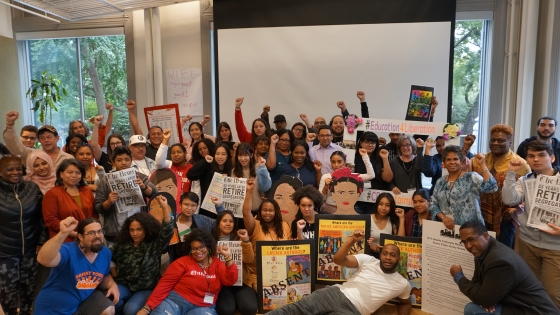Executive Summary
The purpose of this research project was to learn about the ways that universities and colleges are preparing New York City teachers to implement culturally responsive and sustaining education (CRSE). This study used course descriptions to analyze the opportunities that student-teachers have to develop culturally responsive and sustaining teaching skills at the 10 colleges and universities that award the most teaching certificates in New York City. Each document was analyzed using five CRSE themes: Cultural Background, Relevancy, Sociopolitical Consciousness, Critical Action, and Student Dignity.
There are three major findings from this study:
- Cultural Background and Sociopolitical Consciousness were the most common themes of CRSE represented in course descriptions across sampled programs. Student Dignity and Critical Action were the least common themes of CRSE represented in the course descriptions across sampled programs.
- Six Elementary Education programs and seven Bilingual or TESOL programs of the 10 colleges and universities studied only included CRSE themes in 20% or less of their course descriptions.
- Course descriptions with CRSE themes provide illustrative examples of CRSE in action that can be used to strengthen course descriptions.
The policy recommendations that emerge from this study are categorized at the student teacher level, the teacher preparation program level, the NYC Department of Education level, and the New York State level:
- At the student-teacher level, student-teachers should demand that their teacher preparation programs update all certification requirements to have sufficient CRSE representations or explicitly seek out teacher preparation programs that include extensive coursework in CRSE. If a student is at a school that requires updates to certification requirements, students can form CRSE interest groups and book clubs, and organize CRSE workshops, talks, and seminars.
- At the teacher preparation program level, colleges and universities should add a CRSE foundational course in addition to existing diversity and equity coursework. In student fieldwork, programs should begin cultivating relationships with CRSE practitioners to provide student-teachers with the opportunity to experience CRSE classrooms. If schools add CRSE requirements to teacher certifications, they should also provide training and opportunities for existing student-teachers.
- At the New York City Department of Education level, there should be an expansion of CRSE training for existing teachers, as our study shows teachers are not currently getting adequate and comprehensive CRSE training from the 10 universities and colleges studied.
- At the State level, the Education Board should require a dedicated CRSE course to confer teacher certification and require professional learning (including continuing credits) to include coursework that addresses CRSE-themes.

